History
The building itself has been a Grade II listed building since 27 June 1952. The building dates back to around the Sixteenth Century. Original plaster work ceiling dating from 17th-century can be still seen near the bar. The building has undergone many changes since it was first built. The original stone has been plastered over and clad with stone in other locations. The profile was also changed by the removal of gables and a mock black and white wood work added in 1922 by H.A.Dancey. [1] [2] [3]
The pub has some secret hiding places. During the English Civil War, Oliver Cromwell stayed at the Queens Head on a number of occasions. On one such occasion an attempt was made on his life, the would-be assassin being chased into the bar and shot dead. [2] [4]
In 2005 the Queens Head became a Community Pub. A group of local business people took over the pub with the aim of 'making the Queens a welcoming pub for all', offering live music and even a small library. [5] The Pub is now run by just one of the original members. [4]
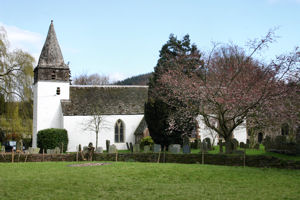
Dixton is a small village located 1 mile (1.6 km) north east of Monmouth, on the banks of the River Wye, in Monmouthshire, south east Wales. The parish originally comprised the two manors of Dixton Newton and Dixton Hadnock, on either side of the river.
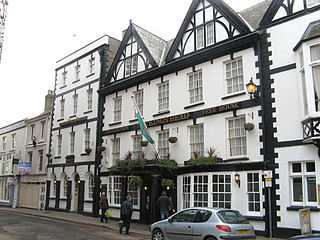
The King's Head Hotel is a hotel standing opposite the Shire Hall in Glyndŵr Street, Agincourt Square, Monmouth, Wales. It dates from the mid-17th century, and as one of the major inns in Monmouth was reputedly visited by Charles I of England in 1645. It has a fine black-and-white painted stone façade and became an important posting inn in the late 17th century, with a yard through an archway where visitors' horses could be stabled and where regular coach services called. In the 18th and 19th centuries, stagecoaches for London left from the inn. The range of buildings along Agincourt Street now includes the former Monmouth Bank and the County Club, while the inn itself is now part of the J D Wetherspoon pub chain. It is one of 24 buildings on the town's Heritage Trail and is a Grade II* listed building.

Monmouth Priory, in Priory Street, Monmouth, Wales, is a building that incorporates the remains of the monastic buildings attached to St Mary's Priory Church. The priory was a Benedictine foundation of 1075, and parts of the mediaeval buildings remain. The buildings were substantially redeveloped in the nineteenth century for use as St Mary's National School, and now form a community centre. The complex is a Grade II* listed building as of 27 June 1952. It is one of 24 sites on the Monmouth Heritage Trail.

The Mayor of Monmouth is an elected position given to a town councillor in Monmouth in Wales. The position dates back about 750 years.

The Old Nag's Head, Old Dixton Road, Monmouth, Wales, is a nineteenth-century public house, with medieval origins, which incorporates a "stone drum tower of the town defences constructed between 1297 and c.1315." The tower is the only "upstanding remains of the town walls of Monmouth." The pub was designated a Grade II* listed building on 26 April 1955, its rating being due to "its interest as an early C19 public house which retains its character as well as a significant portion of a medieval gate-tower."

The Cross is situated in St Thomas' Square, Overmonnow, Monmouth, Wales, in the middle of a roundabout opposite the Church of St Thomas the Martyr and the western end of the Monnow Bridge. Originally mediaeval, and also known as Overmonnow Cross, the cross was reconstructed in 1888 and has been classed as a Grade II listed structure since 15 August 1974.

Vauxhall Fields, also known as Vauxhall Meadows, are water meadows to the northwest of Monmouth town centre, Wales. The River Monnow borders the meadows on two sides. The meadows have generally remained free of development. The area has been prone to flooding on many occasions over the years.
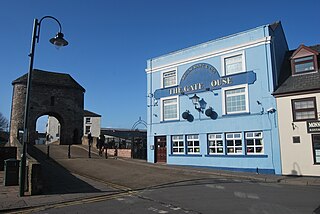
The Gatehouse, also known as The Gate House, is a public house located next to Monnow Bridge in Monmouth, Wales. The pub was known as the Barley Mow until it changed its name in 1993. It is the only public house in Monmouth located beside a river. The pub has a restaurant area, seated balcony and a function room.

Wyastone Leys is a country house estate and Grade II listed building situated near Ganarew, in the southwestern corner of The Doward, in Herefordshire, England. The house and estate has also been known as The Leys or Lays House. It is located 2 miles (3.2 km) from Monmouth and 8 miles (13 km) from Ross-on-Wye. The house is in close proximity to the River Wye and less than 50 metres (160 ft) from the county boundary between Herefordshire and Monmouthshire.

The Punch House is a public house and hotel located at Agincourt Square, Monmouth, Wales.

Agincourt Square is an open space in the centre of Monmouth, Wales, in front of the Shire Hall. The area has been used for public functions and markets over the centuries.
There are a number of war memorials in Monmouth, Wales.

The Three Horseshoes is a public house in Drybridge Street in the Overmonnow area of Monmouth, Wales. The pub has also been used as an Inn and also known as The Three Horse Shoes Inn. The building has been a Grade II Listed building since 15 August 1974. Appears of 19th century but of C17th origin. 2 storeys, roughcast as stone with a hooded doorway

The Vine Tree is a public house situated in Monnow Street in the town of Monmouth, Wales. The building has been a Grade II Listed building since 18 November 1970.

Parade House, is a Grade II listed building in Monk Street, Monmouth, Wales. The building is 18th-century in origin and has three storeys, gothicised windows, an ornate staircase and a hipped roof.
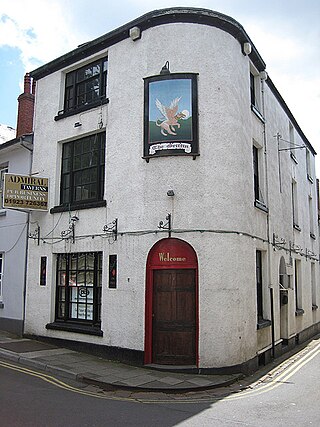
The Griffin is a former public house in Whitecross Street, Monmouth, Wales. The building dates from the 18th century and has been grade II listed since 2005. Its name and sign refer to the legendary creature, the griffin.
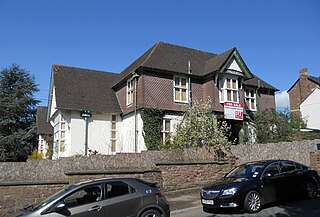
The Cottage Hospital was a community hospital on the Hereford Road in Monmouth, Wales.

The Mayhill Hotel is a public house and hotel located Wyesham Road, Monmouth, Wales. The pub is situated between the roads leading to Wyesham and the Forest of Dean and as such claims it is the Last Pub in Wales.
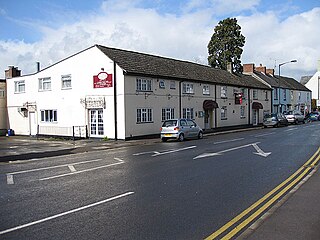
The Riverside Hotel is a public house and hotel located in Cinderhill Street, Monmouth, Wales. The hotel has a bar and a function room and has 17 bedrooms.

The Green Dragon is a public house and inn located in St Thomas Square Monmouth, Wales. The pub provides live music on weekend evenings and during the annual Monmouth Festival the pub is used as a venue for entertainment.























